Paste Magazine‘s web page claims that there have been 17 film and television adaptions of Pride and Prejudice. (Although author Frannie Jackson includes Bridget Jones’ Diary and an episode of the children’s show Wishbone.) Still she has put me on to several adaptations I wouldn’t have known about at all, including a 1952 television miniseries in which Darcy is played by none other than a young Peter Cushing!
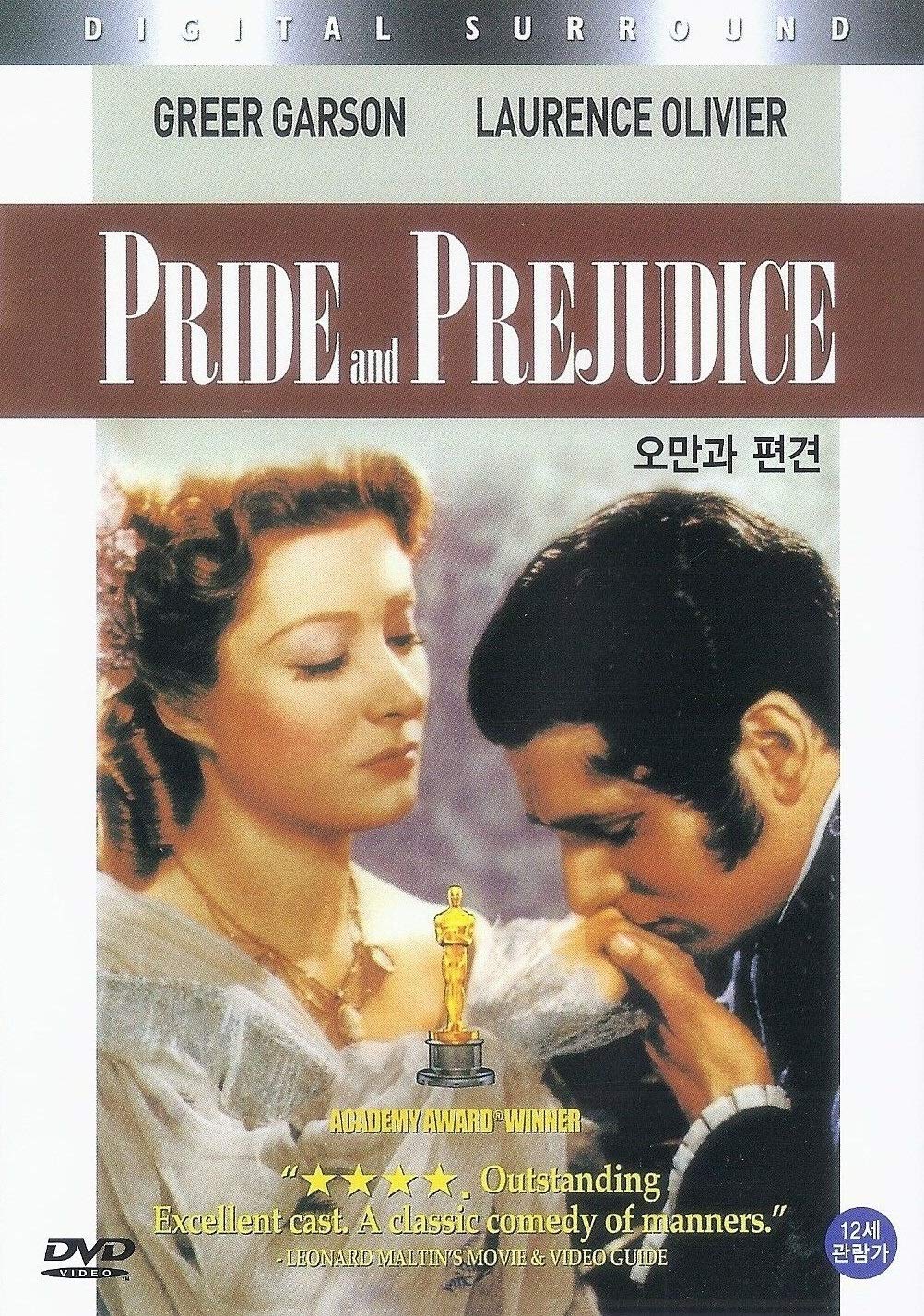 1940 (MGM) – Many folks remember the 1940 movie with Greer Garson and Laurence Olivier, though I confess that I was put off by the carriage race at the beginning. People have also complained about a non-canon “twist” at the end. Sorry I never got that far. It is claimed that the chemistry between Garson and Olivier is excellent, though.
1940 (MGM) – Many folks remember the 1940 movie with Greer Garson and Laurence Olivier, though I confess that I was put off by the carriage race at the beginning. People have also complained about a non-canon “twist” at the end. Sorry I never got that far. It is claimed that the chemistry between Garson and Olivier is excellent, though.
To see a DVD listing on Amazon, click the little picture. (Fine print: If you click on any Amazon link from this site and buy on that visit we get a dollar or so commission. This goes to help us stay slightly less in the red every year, at no cost to you. If you hold off, then you see it pop up on, say, Weather.com, and you buy it there, those folks, they get the commission. So please, consider coming back through our site if anything we post here piques your interest.)
Also, several streaming services have offered this, usually for $2-5, if you don’t feel the need to own it.
1980 (BBC) – A far more authentic, if low-budget portrayal of the story was presented in BBC’s 1980 miniseries. As I mentioned on another page, the first generation of BBC adaptations of Austen tended to suffer from over-reserved acting and poor pacing. 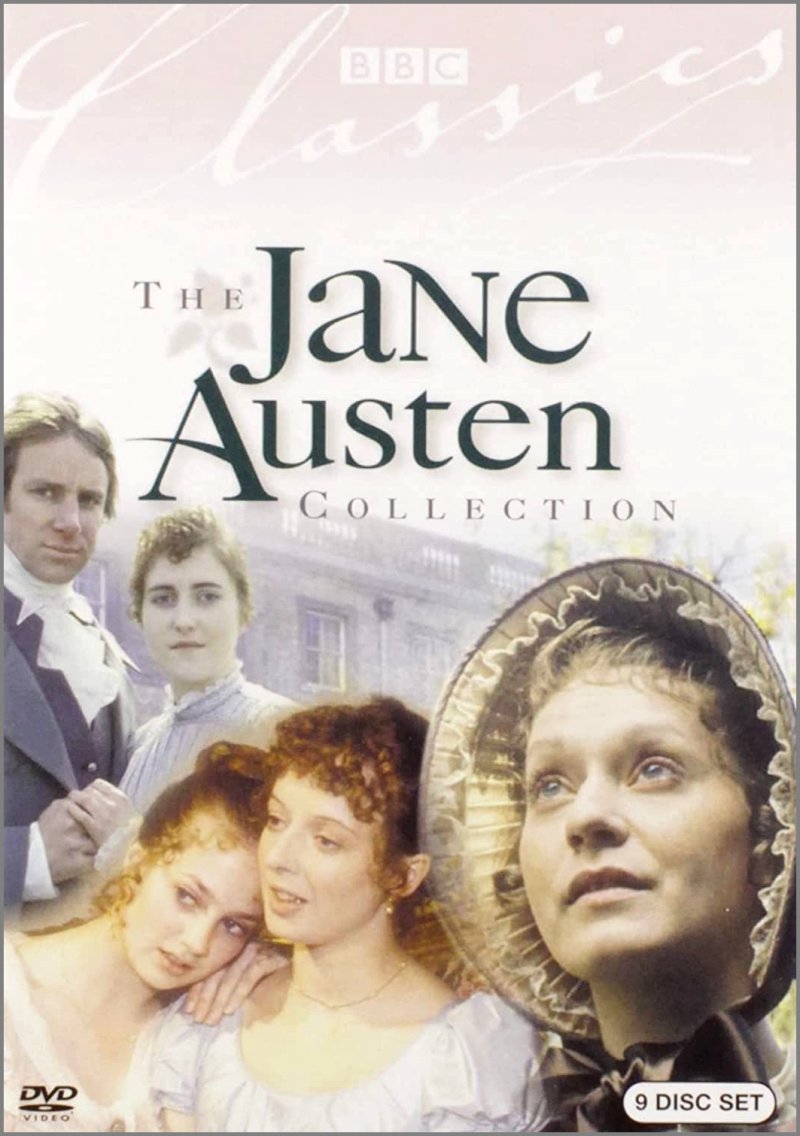
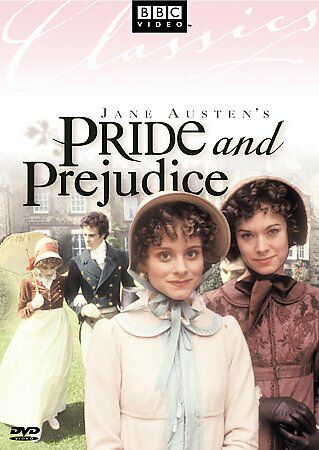 But to many folks of my generation, this was the first version that really enabled them to visualize the characters or to follow certain points of the plot.
But to many folks of my generation, this was the first version that really enabled them to visualize the characters or to follow certain points of the plot.
It has been released on DVD, but is currently only available new in a six-work collection of BBC’s first-generation Austen adaptations. It has occasionally turned up free on streaming channels like Amazon Prime. At the moment (March, 2022), it is available for free on BritBox. (This link should take you to it if you’re a Britbox subscriber.)
Which Brings us to “Modern” Adaptations – There have been other adaptations, but as of 2022, the two that most people remember most fondly today are the 1995 six-part British miniseries starring Jennifer Ehle and Colin Firth and the 2005 theatrical release starring Keira Knightley and Matthew Macfadyen.
Yes, as of this writing, they are 27 and 17 years old respectively, but they are both so well done, no one has seriously considered adding a faithful adaptation since (though spinoffs like Austenland, Lost in Austen and Death Comes to Pemberly have capitalized on the widespread popularity of these adaptations).
1995 BBC – The 1995 six-part series has great actors, great acting, great writing, and great direction. For Austen lovers, it also has a bunch of minor plot bits and minor characters that tend to get filtered out of theatrical releases. 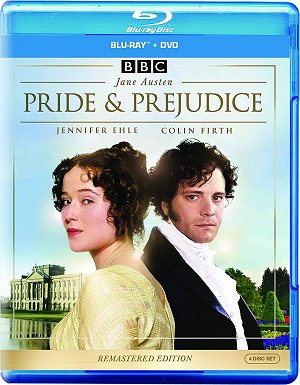
Jennefir Ehle fairly sparkles as Elizabeth; her every expression tells a story, especially her amused, but gentle smiles that reflect her father’s ability to find humor in even the most awkward situations. You have no trouble believing that a person used to deference from those around him would be intrigued by a woman of equal intelligence who feels no need to impress him and whom he cannot intimidate.
For an entire generation, Colin Firth is Darcy. Compared to Matthew Macfadyen, his character starts out aloof and almost brittle. So the contrast is emphasized when he finally comes around to confess his love for Elizabeth, and – even more unexpected – continues to be smitten after she rejects him.
At the beginning, Firth’s Darcy is sparing of words, and nothing in his bearing or tone leads you to imagine he’s trying to win sympathy or build bridges with anyone in the room – or that he is even making sure he is understood. Every sentence is like a tennis ball lobbed just over the net, and if you aren’t close enough to return it, that’s your problem. To me that represent’s Darcy’s character at those points in the book perfectly. Even when Firth’s Darcy is starting to become attracted to Elizabeth, he doesn’t give her any hints until the “pressure builds,” as it were, and he blurts it all out at once in the most artless manner possible.
Not that the audience is kept in the dark altogether. There are hints, just as there are in the novel, and then there’s the dive into the pond, which is definitely not in the book. Unlike the 1980 BBC version, you see that Darcy is ravaged by emotions he can’t control. Yes, it’s all in the book if you read between the lines, but – unlike the Brontës’ – Austen prefers to let the reader work that out. Still, by showing rather than hinting, scriptwriter Andrew Davies makes the romantic aspect of the story more apparent to modern audiences.
I most appreciate the depth given to the “minor characters.” Benjamin Whitrow shines as Mr. Bennet – his good-humored chiding, his pretended exasperation at his family’s oddities, his amusement at Collins, all hit the the mark exactly. David Bamber’s Collins and Adrian Lukis’s Wickham are completely believable as well, even if they make your skin crawl a little. Not to mention that Barbara Leigh-Hunt illuminates the ridiculous side of Lady Catherine’s character as well as the harsher side.
2005 (Focus Features/MGM) – If you want a straightforward summary of the story with the least important bits and characters filtered out, but the romantic aspects emphasized, this one is for you.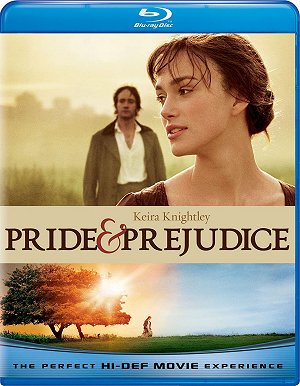
In some ways, the major difference involves Matthew Macfadyen. His delivery is softer, more thoughtful throughout. Except when he is being deliberately jerky in his first appearance, you have the sense that he is actually trying to communicate with those around him. Back to the tennis metaphor, each sentence is a gentle serve that almost begs to be returned in kind.
Also, at least one person I live with thinks Macfadyen is more attractive than Firth, which probably affects how they perceive Darcy’s character as well, though I can’t speak to that.
Similarly, Keira Knightley’s Elizabeth has fewer “rough edges” than Ehle’s. The attitude of bemusement that helps Ehle’s character seem less affected by events around her only appears on occasion. When Knightley’s Elizabeth is angry, confused, or upset, she shows it in ways that keep the audience from having to guess what she’s thinking.
To me, the softening of both major characters is both an attempt to emphasize the romatic aspects of the story and an accommodation to the much shorter timeframe. Macfadyen’s Darcy doesn’t have four hours to reform his character as Firth does.
Again, the “minor characters” shine. Tom Hollander, who was Knightley’s nemesis in two Pirates of the Carribean movies, excells as the sycophantic Mr. Collins. Kelly Reilly’s Caroline Bingley sparkles in the drawing-room scenes especially. Simon Woods’ Bingley provides the ideal comic offset to Darcy’s apparently stern nature. Dame Judi Dench’s Lady Catherine is restricted to showing her domineering side (possibly due to time constraints), but as a potential obstacle to Elizabeth’s happiness, she is much more daunting than Leigh-Hunt’s interpretation.
But best of all – to non-purists at least – is probably Donald Sutherland’s portrayal of Mr. Bennet. He does display Bennet’s wry humor at all situations, but he seems less in touch with the “goings on” in the Bennet household than Whitrow’s Bennet. Which makes his eventual support of Elizabeth’s decision to refuse an unsuitable suitor more fun. Sutherland’s Bennet is “dumb like a fox.”
Aside from the differences in characterizations, Joe Wright’s direction also shows the Bennet household “Longbourn” as more of a “working farm” than any of the other estates. This enhances the contrast with Rosings, Pemberly, and even Netherfield. Technically, Elizabeth is correct when she tells Lady Catherine that Darcy “is a gentleman and I am a gentleman’s daughter,” because both are untitled, landed gentry. But the reinterpretation of Longbourn highlights the contrast between Darcy and the Bennets’ stations in society and helps explain Lady Catherine’s disdain for all things Bennet.
And the Winner Is: Both the 1995 and 2005 Version – When you want a couple hours of romantic entertainment, without the distraction of scenes and characters that are not generally considered crucial to the plot, go for the 2005 MGM release with Keira Knightley and Matthew Macfadyen.
When you’re stuck in the beach house on a rainy day and want a few hours’ entertainment, choose the 1995 BBC version with Jennifer Ehle and Colin Firth.
